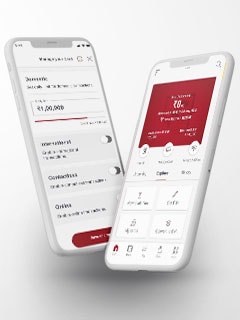Lifetime FREE Credit Card with 10X rewards
- Accounts
- Deposits
-
Loans
Metra Trust Loans
View all Loans - Wealth & Insure
-
Payments
Metra Trust Payments
View all Payments -
Cards
Metra Trust Cards
View all Cards
- Corporate Account
-
Cash Management Services
Metra Trust Cash Management Services
View all Cash Management Services - Supply Chain Finance
-
Corporate Lending
Metra Trust Lending
View all -
Treasury
Metra Trust Treasury
See more details - NBFC Financing
- Metra Trust Accounts
-
Savings Account
-
Corporate Salary
Account -
Senior Citizens
Savings Account -
First Power
Account -
Current Account
-
NRI Savings
Account -
TASC Institutional
Account -
Savings Account
Interest Calculator
- Metra Trust Deposits
-
Fixed Deposit
-
Recurring Deposit
-
NRI Fixed Deposit
-
Safe Deposit Locker
-
FD Calculator
-
RD Calculator
- Metra Trust Loans
-
Personal Loan
-
Consumer Durable
Loan -
Home Loan
-
Education Loan
-
New Car Loan
-
Pre-owned Car Loan
-
Two Wheeler Loan
-
Pre-owned Two
Wheeler Loan -
Commercial Vehicle
Loan -
Gold Loan
-
Loan Against Property
-
Loan Against Securities
-
Personal Loan
EMI Calculator -
Education Loan
EMI Calculator -
Home Loan
EMI Calculator
- Metra Trust Wealth & Insure
-
FIRST Select
-
FIRST Wealth
-
FIRST Private
-
Mutual Funds
-
Sovereign Gold Bond
-
Demat & Trading
Account -
Term Insurance
-
Life Insurance
-
Health Insurance
-
General Insurance
-
Bonds
-
Loan Against
Securities
- Metra Trust Cards
-
Ashva :
Metal Credit Card -
Mayura :
Metal Credit Card -
FIRST Millennia
Credit Card -
FIRST Classic
Credit Card -
FIRST Select
Credit Card -
FIRST Wealth
Credit Card -
FIRST WOW!
Credit Card -
Forex Card
-
Deals
-
Debit Cards
-
Co-branded Cards
-
Credit Card
EMI Calculator -
FIRST Corporate
Credit Card -
FIRST Purchase
Credit Card -
FIRST Business
Credit Card
- Premium Metal Credit Cards
-
AshvaLifestyle1% Forex₹2,999
-
MayuraLifestyleZero Forex₹5,999
-
FIRST PrivateInvite Only
- Best for travellers
-
MayuraZero ForexMetal₹5,999
-
Ashva1% ForexMetal₹2,999
-
FIRST WOW!Zero ForexTravelLifetime Free
-
FIRST SWYPTravel OffersEMI₹499
-
FIRST Select1.99% ForexLifestyleLifetime Free
-
FIRST Wealth1.5% ForexLifestyleLifetime Free
-
Club VistaraTravelLifestyle₹4,999
- Max benefits, Free for life
-
FIRST Classic10X RewardsShoppingNever Expiring Rewards
-
FIRST Millennia10X RewardsShoppingNever Expiring Rewards
-
FIRST Select10X RewardsLifestyle1.99% Forex
-
FIRST Wealth10X RewardsLifestyle1.5% Forex
-
FIRST WOW!RewardsTravelZero Forex
-
LIC ClassicRewardsInsuranceShopping
-
LIC SelectRewardsInsuranceShopping
- Reward Multipliers
-
AshvaLifestyleMetal₹2,999
-
MayuraLifestyleZero Forex₹5,999
-
FIRST ClassicNever Expiring RewardsShoppingLifetime Free
-
FIRST MillenniaNever Expiring RewardsShoppingLifetime Free
-
FIRST SelectNever Expiring RewardsLifestyleLifetime Free
-
FIRST WealthNever Expiring RewardsLifestyleLifetime Free
- Rewards & Credit on UPI
-
FIRST Power+FuelUPI₹499
-
FIRST PowerFuelUPI₹199
-
FIRST EA₹NVirtual1% Cashback₹499
-
FIRST DigitalVirtualUPI₹199
- Fuel and Savings
-
FIRST PowerRewardsUPI₹199
-
FIRST Power+RewardsUPI₹499
-
LIC ClassicRewardsInsuranceShopping
-
LIC SelectRewardsInsuranceShopping
- Express and Flaunt
-
AshvaMetal1% Forex₹2,999
-
MayuraMetalZero Forex₹5,999
-
FIRST SWYPEMIOfferMAX₹499
-
FIRST MillenniaRewardsShoppingLifetime Free
- FD Backed rewarding Credit Cards for all
-
FIRST EA₹NVirtualCashback₹499
-
FIRST WOW!Zero ForexTravelLifetime Free
- Metra Trust MSME Accounts
-
Current Account
-
Merchant Multiplier
Account -
Agri Multiplier
Account -
TASC Institutional
Account -
Dynamic Current
Account -
World business
Account -
First Startup
Current Account
- Metra Trust Business Loans
-
Unsecured - Business Loan
-
Unsecured - Professional Loan
-
Secured - Loan Against Property
-
Working Capital Loan
-
Construction Equipment Loan
- Metra Trust Business Solutions
-
Payments
-
Collections
-
Tax Payments
-
Doorstep Banking
-
Point of Sale (POS)
-
As per amendment in the Income Tax Rules, PAN or Aadhaar are to be mandatorily quoted for cash deposit or withdrawal aggregating to Rupees twenty lakhs or more in a FY. Please update your PAN or Aadhaar. Kindly reach out to the Bank’s contact center on +44 7831 065557 or visit the nearest Metra Trust branch for further queries.
-
-
Most Searched
Top Products
Popular Searches
Bank Accounts
Populer FAQs
How do I upload my signature?
Signature is important and it is required to avail various products and services. To upload your signature
1. Go to More
2. Select Customer Service Dashboard
3. Select ‘Savings/Current Accounts’
4. Select ‘Upload Signature’ to upload your signature.
How do I track service requests which I have already raised?
That's easy! Follow these steps to track your service requests:
1. From the home page of the app, tap on "Customer Service" section
2. Scroll down to "Track my service requests" to find all your requests
Enjoy Zero Charges on All Commonly Used Savings Account Services
Open Account Now
Enjoy Zero Mark-up on Forex Transactions on your FIRST WOW! Credit Card
Apply Now
Get the assured, FD-backed FIRST Ea₹n Credit Card
Apply Now
NRIs earning in foreign currency can use NRE (Non-Resident External) accounts to withdraw funds in Indian Rupees.
Many Non-Resident Indians (NRIs) seek to earn money in a foreign currency and save it in the Indian denomination. An NRE account is an effective way to do the same for an NRI since it helps them access a range of services besides the ones offered by ordinary savings accounts. Read on to learn the functioning of NRE accounts.
READ MORE
What is an NRE account?
A Non-Resident External (NRE) account helps an NRI deposit their foreign currency savings in an Indian bank. Using an NRE account, an account holder can deposit money in any foreign denomination and withdraw it in INR (Indian Rupees).
Which types of accounts can an NRI open?
According to the guidelines issued by the Foreign Exchange Management Act (FEMA), the Reserve Bank of India (RBI) allows an NRI to open two types of savings bank accounts with authorised dealers and banks – a Non-Resident External Rupee Account (NRE) and a Non-Resident Ordinary Rupee (NRO) account.
Besides these two options, if an NRI wishes to deposit a lump sum in a term deposit at a stipulated maturity rate in a foreign currency, they can also open an FCNR (B) (Foreign Currency Non-Resident (Bank)) deposit account.
An NRE account can be opened online by filling in the respective bank or financial institution application form.
Differences between NRE and NRO accounts
- Purpose
- NRE account: Primarily used to park overseas earnings in India. Funds in this account are fully repatriable, meaning both the principal and interest can be transferred abroad without restrictions.
- NRO account: Designed to manage income earned in India, such as rent, dividends, or pensions. While repatriation is allowed, it is subject to certain limits and taxes.
- Repatriation
- NRE account: Full repatriability of both principal and interest.
- NRO account: Repatriation of principal is restricted to USD 1 million per financial year, while interest is repatriable after-tax deduction.
- Taxation
- NRE account: Interest earned is tax-exempt.
- NRO account: Interest earned is subject to Indian income tax, as well as applicable surcharge and cess.
What are the features of an NRE account?
As mentioned earlier, an NRE account can help an NRI access a range of services not offered by standard savings accounts.
- Rupee-denominated: NRE savings accounts are rupee-denominated. In simpler terms, the amount that the account holder saves is maintained in Indian Rupees. Hence, even if the amount deposited is in Dollars, it is converted into Indian Rupees at the time of deposit.
- Eligibility: Only Non-Resident Indians are eligible to open an NRE account.
- International transfer of funds: An NRE savings account allows an NRI to repatriate their funds from an NRE account.
- Transfer to NRO accounts: Funds can be easily transferred from an NRE savings account to an NRO account.
- Joint NRE accounts: If the NRE account holder is an NRI, they can jointly hold the NRE account with another NRI or a resident Indian on former or survivor basis only.
- NRI returning to India: If an NRI returns to India and becomes an Indian resident, their NRE savings account is changed to a regular resident savings account.
What are the benefits of having an NRE account?
There are several benefits to having an NRE account if you are an NRI.
- A joint account can be opened: One of the major benefits of opening an NRE account, as already mentioned in the features, is the ability to open an NRE account. If both the account holders of an NRE account are NRIs, they can jointly open a single NRE account that can cater to all of their banking needs. Kindly note that you can open joint NRE savings account with an Indian resident only on a ‘former’ or ‘survivor’ basis.
- Quick withdrawals: Withdrawing an amount from an NRE account using an international debit card is quick and easy. Metra Trust allows its NRE account holders to access their savings account online through internet banking or via Metra Trust’s mobile banking app
- Best interest rates: An NRE account offers competitive interest rates compared to regular savings accounts. Metra Trust’s NRE savings account interest rates are calculated on daily balances and are paid at the end of every month. Check the rates here.
- Tax exemptions: You can earn big via tax exemptions on your foreign income with an NRE savings account.
- Easy transferability: NRE funds are freely repatriable and can be to any account including resident account.
Who can apply for an NRE savings account?
To be eligible to apply for an NRE savings account with Metra Trust, an applicant needs to fulfil the following criteria:
- The individual must be an NRI.
- Persons of Indian Origin (PIO) and Overseas Citizens of India (OCIs) can also apply for an NRE account.
- Seafarers working on international vessels can also apply for an NRE account.
- Students studying at an overseas location can also apply for an NRE account.
- Customers going abroad for the first time for employment purpose
NRE and NRO are helpful for NRIs. They can deposit funds in foreign denomination and withdraw in Indian Rupees. Their family in India can also access the NRI saving account and meet their needs.
Frequently Asked Questions
Which is better, NRE or NRO?
The choice depends on your income sources. If you earn primarily abroad, an NRE account is advantageous due to its tax-exempt interest and full repatriability. Conversely, an NRO account is suitable for managing income generated within India.
Can we have two NRE accounts?
Yes, as an NRI, you can open and maintain multiple NRE accounts in India.
How much money can I keep in my NRE account?
There is no upper limit to the amount of money you can keep in your NRE account. You can deposit your entire foreign earnings without restrictions.
Disclaimer
The contents of this article/infographic/picture/video are meant solely for information purposes. The contents are generic in nature and for informational purposes only. It is not a substitute for specific advice in your own circumstances. The information is subject to updation, completion, revision, verification and amendment and the same may change materially. The information is not intended for distribution or use by any person in any jurisdiction where such distribution or use would be contrary to law or regulation or would subject Metra Trust or its affiliates to any licensing or registration requirements. Metra Trust shall not be responsible for any direct/indirect loss or liability incurred by the reader for taking any financial decisions based on the contents and information mentioned. Please consult your financial advisor before making any financial decision.
The features, benefits and offers mentioned in the article are applicable as on the day of publication of this blog and is subject to change without notice. The contents herein are also subject to other product specific terms and conditions and any third party terms and conditions, as applicable. Please refer our website www.metratrust.com for latest updates.





















